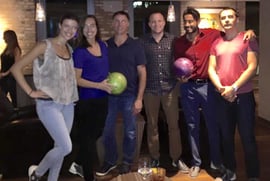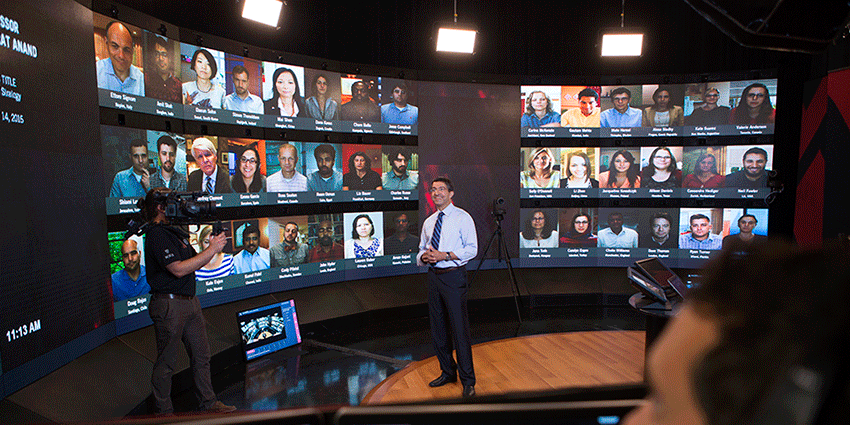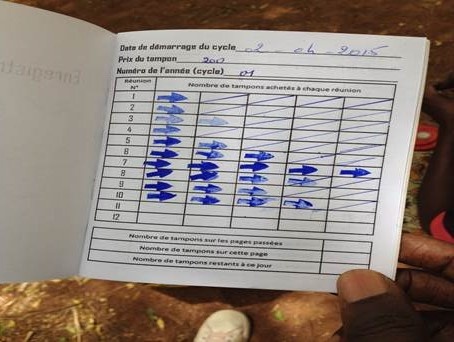
As a captain for American Airlines, former USAF pilot, and veteran, my entire career focus has been on perfecting the skills and knowledge that would make me the best pilot I could be. After upgrading to captain, I decided to make an assessment of how I fit into the larger picture of my company and how I could contribute to other areas of the operation.
The results were a wakeup call: I had a solid background in the technical aspects of my profession, but my knowledge of airline economics, American’s financial performance, and how we forecast and plan for the future was thin. I realized that if I wanted to broaden my career, I would have to step up my game and approach these areas with the same rigor as I took to flying.
But how could I find time for an MBA with a flying schedule that changes monthly and sends me to different cities across the USA, Canada, and Mexico?
Unfortunately, most of the online classes I looked into were more theoretical in nature and followed the usual format of lecture, homework, and exam. I wanted something that would be real-life, not theoretical. Being a fan of HBS’ case study method, I visited their website and learned of a new program called HBX CORe. I signed up before the ink was dry.
Finding A Work/Life Balance
My biggest challenge was trying to fit HBX into my daily schedule while balancing time with my family and the challenges of my job. As an airline pilot, I am usually away flying at least half of the month. Trips usually have erratic hours, include long duty days, and require me to cross multiple time zones, which can make studying difficult.
Using a whiteboard, I identified what pilots refer to as “threats,” or obstacles interfering with accomplishing my goal and ways around them.
Next I used a mission planning format from my USAF days and came up with a plan to fit HBX into work and family life:
- Organize & Prioritize: Identify deadlines for quizzes and writing assignments, paying particular attention to “max effort” weeks with multiple deadlines.
- Execute: Allocate “hard” study hours per day. Attempt to fly trips that keep you on a normal body clock. Put a pad between each module’s targeted completion date and the quiz deadline. Stay focused and remember there is no “freeze” button once HBX starts—the clock is always running.
- Assess your progress: Are you meeting your goals?
While I was away a lot, a big plus was our layover hotels: they’re quiet, have a stable internet connection, and offer a good desk. My big takeaway from this aspect of the course is that with the right plan, you can find the time to devote to coursework.
Adjusting to a New Way of Learning
HBX is a revolutionary approach to education and several aspects of it are definitely worth sharing with any prospective student, especially if you have been out of college several years or are well established in your career. First, it’s essential you “wrap your arms around” the inductive learning model. While I’m not an educator, many of us learned from the deductive model—which is structured around concept, examples, and application. However, in the inductive model it’s the other way around: you’re presented with examples and have to derive the concept. Since one person can’t see as many relations between examples as a group, inductive learning is supercharged when you form a team of learners.
The HBX platform’s peer-to-peer help or peer messaging features will help you build a team and better understand concepts—use it! Another important aspect of the class is to be what pilots refer to as a “good wingman.” Seek and give help freely. And don’t have thin skin—welcome honest feedback from your classmates. The end of module reflections are a great opportunity to fill in gaps in your knowledge and offer constructive comments to classmates that have a great take on a concept.
Remember: HBX is a collaborative learning experience, not a season of Survivor.
Without a doubt, HBX has exceeded my expectations for learning. The platform is easy to navigate and well organized. The video, graphics, and interactive exercises will bring life to important concepts in an unforgettable way. You’ll get to sit in the seat of analysts, managers, and accountants and solve real world problems—it’s like practicing your flying in the simulator before you go out on the line. And most importantly, it takes subjects like Business Analytics, Economics, and Accounting and presents them at the customer-product level. That’s where a business either wins or loses.
What's on the Horizon
Now that I’ve finished HBX, I am looking at a variety of ways to apply what I have learned to help make American Airlines a better company. One example is American’s Fuel Smart initiative. Created during the great fuel price spike of the last decade, this program looks at ways to save incremental amounts of fuel on every flight (consistent with safety, of course!). With over 2,500 flights each day, small savings on each flight add up to big savings over the long haul. And there is a greater good to this program as well—a portion of the savings goes to aid wounded veterans. Fuel Smart also helps reduce American’s carbon footprint, too.
Another program that interests me is the Aviation Safety Action Program, or ASAP, for short. ASAP is a safety improvement program jointly administered by the Federal Aviation Administration, American Airlines, and the Allied Pilots Association—the professional association representing our pilots. Under the ASAP program, events or conditions that affect flight safety are “self-reported” by pilots to the program. This information is analyzed and recommendations are made to improve procedures, purchase equipment or upgrades, or correct conditions that affect flight safety. By the way, ASAP is probably the biggest contributing factor to the drastic reduction in aviation accidents or incidents in recent years.
Finally, both American and the Allied Pilots Association need individuals to work on contract initiatives that are a win-win for both sides. By seeking creative contract initiatives, my company can differentiate itself from the competition and create a competitive advantage. While these programs (there are more) aren’t apparent to you as you board your flight, they allow American to operate more efficiently and deliver a safer, more reliable product to the customer at a better price.
Although Fuel Smart, ASAP, and contract negotiations are from different ends of the management spectrum, they all represent a practical use of what I learned at HBX. Statistical analysis, hypothesis testing, budget forecasting, relative cost analysis, and product differentiation are just a few areas where HBX will help me make a big contribution. And I’m sure that other adult learners that are established in a career will see similar opportunities in their fields. My recommendation: expand your horizons, you’ll be glad you did. When I was a new-hire flight engineer almost twenty-four years ago, a senior captain gave me this admonishment: leave the profession better than when you started in it. I hope to do so.
One final note: thank you to Professors Hammond, Anand, and Narayanan as well as the HBX staff for a great experience. Also thank you to my February 2015 classmates for your insight and camaraderie.
Want to hone your business skills to help you advance in your career and feel more confident contributing to conversations about finance, economics, and business analytics?

About the Author
Jim Dubela participated in the February 2015 HBX CORe cohort. He is a commercial airline pilot and veteran who plans to use his CORe knowledge to work on multiple initiatives within American Airlines.

















 Going out for drinks or dinner is fine as long as it's in a place that isn't too loud, but it can be awkward if you're not a natural conversationalist. Some students also use meetups as a study group or a way to further discuss course concepts!
Going out for drinks or dinner is fine as long as it's in a place that isn't too loud, but it can be awkward if you're not a natural conversationalist. Some students also use meetups as a study group or a way to further discuss course concepts!












 Trickle Up participants at home with dried millet and sorghum
Trickle Up participants at home with dried millet and sorghum Meeting a of a village savings group
Meeting a of a village savings group My transport in Ouagadougou
My transport in Ouagadougou Notebook tracking contributions to the communal savings fund
Notebook tracking contributions to the communal savings fund A program participant brewing sorghum beer to sell in markets and from her house
A program participant brewing sorghum beer to sell in markets and from her house




